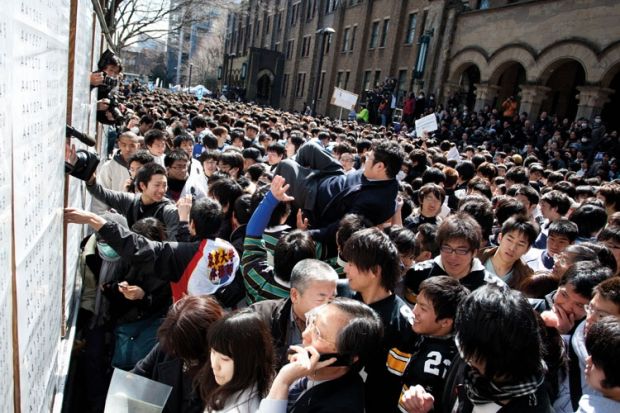Source: Alamy
View the full Asia University Rankings 2014 results
Claim your free copy of the full digital supplement
More Chinese universities have entered the Times Higher Education Asia University Rankings 2014, while its rival Japan has lost representatives.
The shift in balance between the two biggest higher education powers in Asia takes place against a backdrop of the Beijing government rapidly increasing research funding, while its neighbour across the East China Sea wrestles with cuts.
Japan is still the number one nation in the rankings – with 20 representatives in the top 100 including the University of Tokyo in first place – but has lost two institutions since 2013. By contrast, mainland China has gained three new representatives in the rankings, taking its total to 18.
South Korea takes the third spot with 14 universities, including three in the top 10, while Taiwan falls from second to fourth place with 13 representatives.
Like the overarching THE World University Rankings, the Asia rankings, for which data are collected and analysed by Thomson Reuters, use 13 indicators to examine performance in teaching, research, knowledge transfer and international outlook.
Research income, research reputation and research influence (measured in terms of “citation impact”, ie, how many times research is cited globally) are all among the measures.
Simon Pratt, product manager at Thomson Reuters, said that China was achieving “only modest gains” in citation impact and reputation in the rankings – despite big increases in government research funding – but that “we are seeing a general trend over recent years that we expect to continue”.
Simon Marginson, professor of international higher education at the Institute of Education, University of London, noted that Japan’s public spending “has been significantly constrained for the past two decades”.
He added: “In higher education, Japan has followed the Westminster model, cutting back funds per student, slowing the growth of investment in research and focusing on enhanced value for money.”
By contrast, Gerard Postiglione, director of the Wah Ching Centre of Research on Education in China at the University of Hong Kong, said that for the Chinese government “world-class universities are a hedge against a slowing economy”.
He argued that “when Japan was where China is now” in terms of economic development, “its universities knocked its high-tech industry into overdrive and its economy blossomed”.
Noting another key factor behind the Chinese government’s increasing spend on universities, Professor Postiglione said that although the nation’s economic strength “impresses the international community…it is soft power that opens the door to international stature”.
Yonghua Song, executive vice-president of Zhejiang University, which rose four places to 41st, said that thanks to Chinese government policy and university performance assessment of staff, “individual research output is increasing, the overall research scale of the university keeps expanding, and the total amount of research funding is growing relatively fast”.
Asked what changes in government policy could aid Chinese universities, he said: “Instead of exercising direct management as before, the government should avoid too much intervention in the operation of universities.”
Listen to the Asia University Rankings 2014 podcast
THE Asia University Rankings 2014: top 10
| 2014 Asia rank | 2013 Asia rank | Institution | Country |
|---|---|---|---|
| 1 | 1 | University of Tokyo | Japan |
| 2 | 2 | National University of Singapore | Singapore |
| 3 | 3 | University of Hong Kong | Hong Kong |
| 4 | 8 | Seoul National University | South Korea |
| 5 | 4 | Peking University | China |
| 6 | 6 | Tsinghua University | China |
| 7 | 7 | Kyoto University | Japan |
| 8 | 10 | Korea Advanced Institute of Science and Technology | South Korea |
| 9 | 9 | Hong Kong University of Science and Technology | Hong Kong |
| 10 | 5 | Pohang University of Science and Technology | South Korea |
Register to continue
Why register?
- Registration is free and only takes a moment
- Once registered, you can read 3 articles a month
- Sign up for our newsletter
Subscribe
Or subscribe for unlimited access to:
- Unlimited access to news, views, insights & reviews
- Digital editions
- Digital access to THE’s university and college rankings analysis
Already registered or a current subscriber? Login





